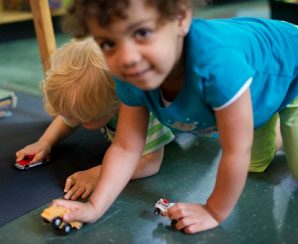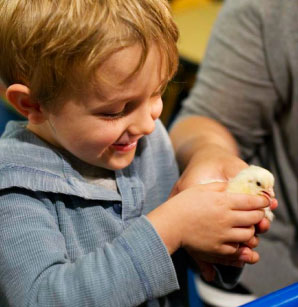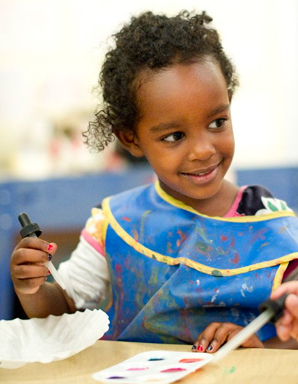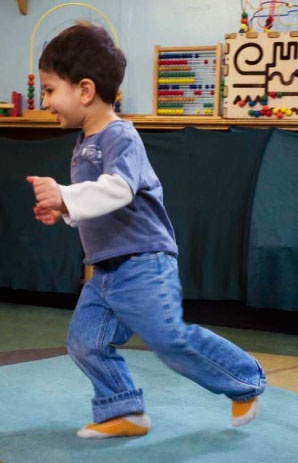


Each class engages in a daily enrichment program. These enrichment programs not only help children to develop their various physical abilities, they also enhance vocabulary as each class has its own vocabulary and terminology and some classes incorporate the use of other languages.

Twos Curriculum
Two year olds are typically learning to develop their fine motor and gross motor skills as well as their vocabulary. They are gaining competence in manipulating objects and becoming independent in toileting and dressing themselves and taking care of their property. In this group language is developing and children are learning to express themselves in various situations, and with the assistance of teachers they are able to achieve their goals with a minimum of conflict. Vocabulary is developing rapidly and some children grow very competent in using language to convey complex thoughts. Teachers work on letter and number recognition as well as playing math games. Children read books every day both at circle time and with individual time with teachers. All programs are tailored to the needs of this group, and confidence builds throughout the year.
Threes Curriculum
Three-year-olds become rapidly more verbal and the level of skill in communicating increases as the year goes on. Young threes often struggle to be heard in a group, and can appear unaware that others are talking. We foster social awareness, and encourage dialogue, active listening, reciprocal conversations. By the end of the year they become more aware of the feelings and motives of others. This awareness helps them to negotiate social situations, make friends, and obtain what they need in an acceptable way. Social/dramatic play becomes increasingly important, and there is a lot of dress-up and role-playing. Being a part of a social group is an increasing focus of a child’s world at this stage, and this focus increases even more as they approach age 4. Children will work on recognizing letters, their names, and will begin writing their names and other words. They will count, sort, and enjoy noticing differences in shapes and identifying group characteristics. Much of this work is done through playful activities and games, and at table time. Teachers create opportunities for children to work in smaller groups at separate tables. As children’s emotions develop, they begin to be aware of deep concepts such as death, and nightmares often feature monsters, which are symbols of their own emotions and anxieties. At group time more and more books are introduced, and there is also quiet reading time where children can select books and read alone or with one or two others. Writing becomes possible as children develop their manual dexterity. They are encouraged to write their own names. With the help of teachers they to write their own stories. Interests begin to blossom into projects, and we often take short trips. We may be able to visit museums or have visitors who present various interesting themes. Trips outside often spark interest in science and nature.
Fours Curriculum
Four-year-olds become more rational, and their language reflects that. They still believe in magic but begin to know the difference between real and not real. They also become aware of the fact that different people have different thoughts. This growing knowledge is often referred to as the Theory of Mind. Their preoccupation is often the group, and acceptance within it. They become skillful players and create complex scenarios and scripts which involve collaboration and flexible role-playing. Four-year-olds are beginning readers, and some can even start reading whole books, while others are still working on letter recognition. Many children begin to write books. Number concepts become more developed and these children can understand and work with graphs and lists – who is in school today and who is not, for instance. Artwork tends to become representational as children develop mastery of art materials and develop fine motor skills. This class works with various languages, and foreign languages are integrated into the daily routines. The Fours class engages in various projects related to their interests, and appropriate to their cognitive development. Teachers keep in mind the standards used in the public school system, and while they do not teach to these standards, they do design creative games and activities to enable children to reach these standards. For instance, a PreK class may have a school ‘store’ and children earn pennies for their class ‘jobs’ – they save enough to buy whatever they need, or just enjoy accumulating. These and other hands on activities bring math to life in the classroom. When our children graduate from the Fours program, they tend to meet and exceed standards, and what they have learned academically, socially, and emotionally gives them a real advantage when they enter other schools.
Enrichment Programs
DANCE
Our teachers provide movement and dance for children on a daily basis. These programs are developmentally appropriate and flexible to allow for the child’s individual expression. Dance helps to develop body awareness confidence and recognizing dance as a way to ply and use creativity. Children work on themes and shapes – curvy, round, straight and directions – over, under, around, and learn to manipulate their bodies in relation to others and to music. In this way they develop gross motor control. In addition we have a structured weekly dance program.
ART
Our teachers’ focus is to build on or scaffold student learning including, looking closely, sorting, re-arranging, noticing, imagining, problem-solving, experimentation and reflection. Various art making skills are addressed and built on through each lesson (e.g. cutting, gluing, mark-making, molding, attaching) Each term we have a Cycle of lessons, Works on Paper, Work in Clay and Building/Construction. Art is an expression of a child’s individuality, not an attempt to create specific projects. And so art classes allow the child to unfold in his or her own approach and vision. These art classes strengthen the child’s fine motor control.
COOKING
We have a full kitchen with a large table where children can learn to measure, mix, cut and roll, and to make things they can eat. Our cooking teachers works with children using both English and Spanish terms so they learn new words as well as learning to cook. Cooking is an important activity as it helps with math concepts and also allows children to become participants in the kitchen.
MUSIC
Teachers incorporate many aspects of music, utilizing our library of musical instruments. Children learn about listening to music as well as moving to music and interpreting various kinds of music with their bodies. They learn that their voice can be developed and utilized in various ways. Developing the voice as a tool of communication is very helpful to young children. We have a library of musical instruments, which children use individually and in a group. We have in addition a weekly structured music program for all the classes.
Celebrations
At Little Mish we like to celebrate children’s birthdays in the classroom . This is an important event in the life of a child. Parent’s may choose to join in the celebrations. Seasonal holidays are an important part of many families lives. When children want to share their cultural traditions we welcome that into the classrooms. It is not our policy to impose religious, cultural or political ideals on children. However, we are always open to having children and parents share their culture with the school community so that we can celebrate that we are all human and what unites us is greater than what divides us.